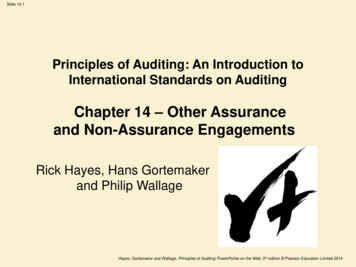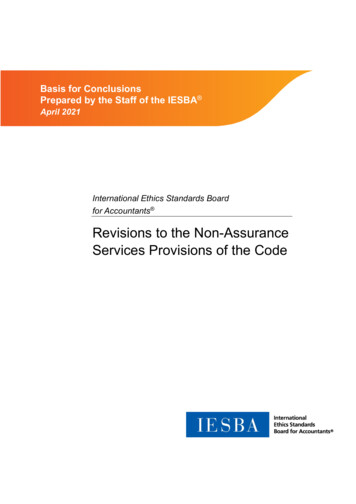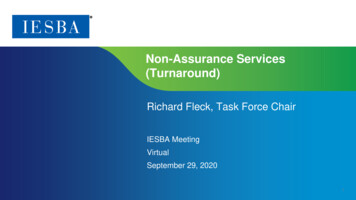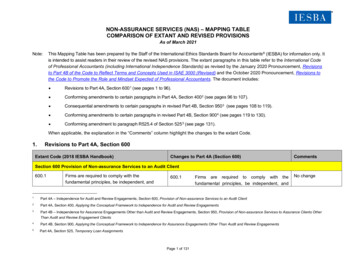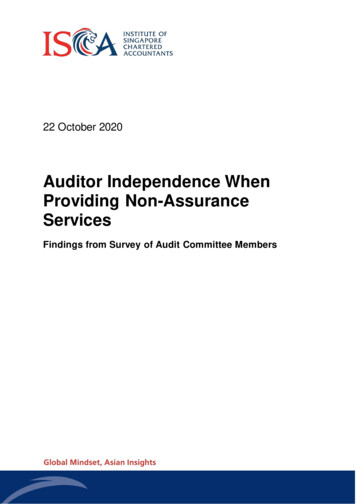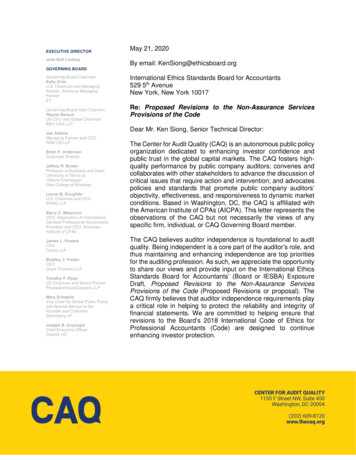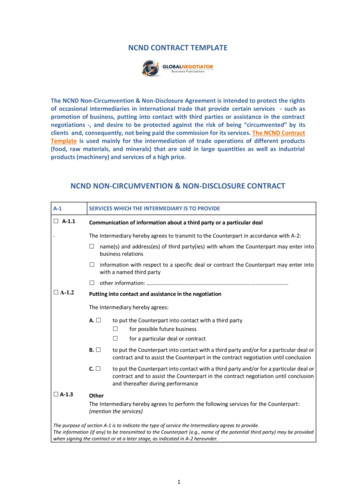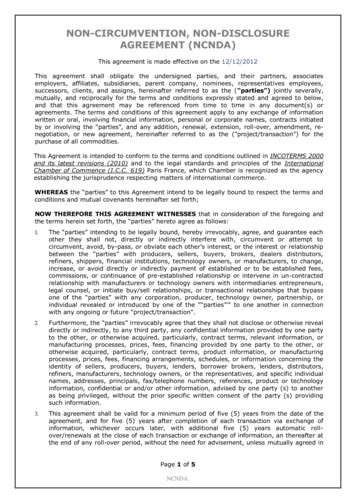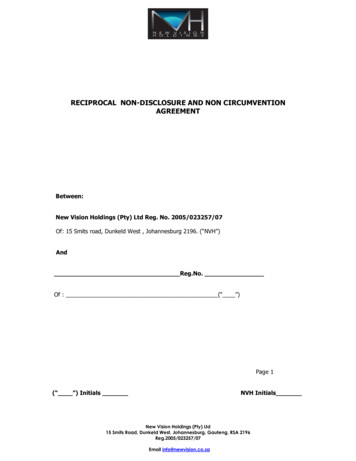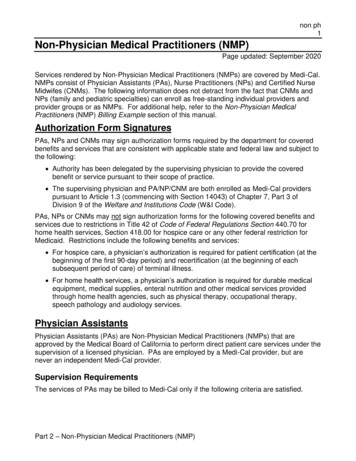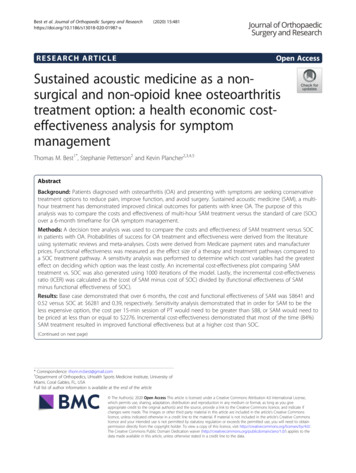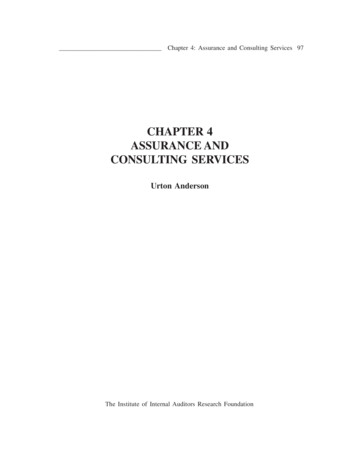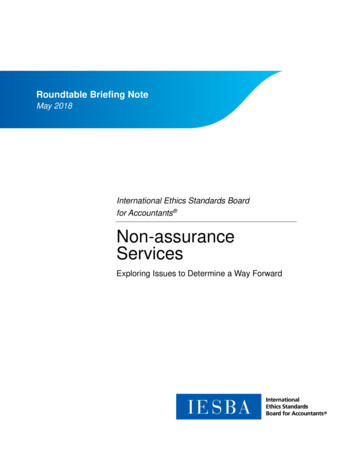
Transcription
IFAC BoardRoundtable Briefing NoteMay 2018International Ethics Standards Boardfor Accountants Non-assuranceServicesExploring Issues to Determine a Way Forward
This document has been prepared by the IESBA Non-assurance Services Working Group.The International Ethics Standards Board for Accountants (IESBA) is a global independent standardsetting board. Its objective is to serve the public interest by setting high-quality ethics standards forprofessional accountants worldwide and by facilitating the convergence of international and nationalethics standards, including auditor independence requirements, through the development of arobust International Code of Ethics for Professional Accountants (including International IndependenceStandards) (the Code).The structures and processes that support the operations of the IESBA are facilitated by the InternationalFederation of Accountants (IFAC).Copyright May 2018 by the International Federation of Accountants (IFAC).2
ROUNDTABLE BRIEFING NOTE – NON-ASSURANCE SERVICESCONTENTSPageI.Background.4II. Overview of Non-assurance Services (NAS) Provisions in the Code .5III. General Policy Objective .6IV. Summary of Specific Issues Identified by Stakeholders .7A. Materiality .7B. Public Interest Entities (PIE) and non-PIE Provisions .8C. Unconditional NAS Prohibitions (“i.e. a Black List”) .8D. New and Emerging Services .9E. Auditor Communication with TCWG .9F. Disclosure and Other Matters .10V. Questions for Roundtable Participants .11Appendix 1: Extract of NAS Prohibitions in the Code for PIEsAppendix 2: Improvements to Assist in the Application of the Conceptual Framework in Relation to theProvision of NAS to Audit Clients3
NON-ASSURANCE SERVICESEXPLORING ISSUES TO DETERMINE A WAY FORWARDI.Background1.Auditor independence is critical to public trust in audited financial statements, and contributes toaudit quality. In recent years, there have been a number of legal and regulatory developmentsaimed at responding to issues affectingThe term non-assurance services is usedauditor independence, including auditthroughout the Code when referring tofirms’ provision of non-assuranceengagements that do not meet the definition of anservices (NAS) 1 to audit clients. 2assurance engagement. An assurance2.Some stakeholders and the PublicInterest Oversight Board have called forIESBA to review its InternationalIndependence Standards relating to theprovision of NAS to audit clients.3.Having completed a number of projectswhich culminated in the April 2018release of a completely rewritten andsubstantively revised International Codeof Ethics for Professional Accountants(including International IndependenceStandards) (the Code 3), the IESBA hasestablished a Working Group to furtherunderstand and respond to those calls.Global Roundtables4.engagement is an engagement in which aprofessional accountant in public practice (PAPP)expresses a conclusion designed to enhance thedegree of confidence of the intended users otherthan the responsible party about the outcome ofthe evaluation or measurement of a subjectmatter against criteria.An audit engagement is a reasonable assuranceengagement in which a PAPP expresses anopinion on whether financial statements areprepared, in all material respects (or give a trueand fair view or are presented fairly, in all materialrespects), in accordance with an applicablefinancial reporting framework. This includesstatutory audits, which is an audit required bylegislation or other regulation.In deciding to hold three global roundtables in North America (Washington, DC, USA), Europe(Paris, France), and Asia Pacific (Tokyo, Japan), the IESBA is seeking to further understandstakeholders’ views about specific issues that might arise when firms and network firms provideNAS to their audit clients and whether changes are needed to the Code to address them.Purpose of Briefing Note5.This briefing note summarizes the NAS issues that the IESBA has identified to-date, in particular, inrelation to audit clients that are public interest entities (PIEs). Some of the issues were raised by1Except where otherwise noted, NAS in this paper is used to refer to the term “non-assurance services” as used in the IESBACode. In some jurisdictions the term “non-audit” services is used in describing similar issues. For example, the term “non-auditservices” is used in the UK to cover any service that does not form part of the audit engagement (i.e., both “non-assurance” and“assurance services” other than an audit).The terms “non-audit services” and “non-assurance services” are not defined terms inthe IESBA Code.2The main focus of this paper and the roundtable discussions is on firms’ provision of NAS to audit clients in the context ofindependence. Some of the issues may be relevant also to circumstances where firms provide NAS to assurance clients in thecontext of independence.3The references to “the Code” in this paper are to the revised and restructured Code which was released on April 9, 2018, andwhich will become effective in June 2019.4
ROUNDTABLE BRIEFING NOTE: NON-ASSURANCE SERVICESrespondents to Exposure Drafts (EDs) relating to the IESBA’s recently completed Safeguards andStructure of the Code (Structure) projects, and respondents to the IESBA’s November 2017 FeesQuestionnaire. The paper is intended to facilitate a multi-stakeholder dialogue to explore possiblesolutions to the public interest issues that have been raised in relation to the provision of NAS byaudit firms. The paper is organized as follows: Overview of NAS provisions in the Code; General policy objective; Summary of specific issues identified by stakeholders; and Questions for roundtable participants.II.Overview of NAS Provisions in the Code6.In addition to the requirement to apply the enhanced conceptual framework 4 to identify, evaluateand address threats when providing NAS to audit clients, Section 600 5 of the Code containsgeneral and specific requirements and application material that apply to firms and network firmswhen providing NAS to audit clients. The general provisions set out in paragraphs 600.1 to R600.10apply in all situations when a NAS is provided to an audit client. Additional and more specificprovisions are set out in subsections 601-610 and apply when providing certain types of NAS toaudit clients. A list of the types of NAS that are dealt with in the Code is included in Appendix 1 ofthis document.7.As part of the general provisions in paragraphs 600.1 to R600.10, the Code includes: An overarching requirement that prohibits the assumption of managementresponsibilities when providing any NAS to audit clients. 6 Management responsibilitiesinvolve controlling, leading and directing an entity, including making decisions regarding theacquisition, deployment and control of human, financial, technological, physical andintangible resources. Clarifications and improvements to assist firms and network firms to better apply theconceptual framework in relationThe conceptual framework specifies theto identifying, evaluating andapproach that all professional accountants,addressing threats created byincluding auditors, are required to use toproviding a NAS to an audit client.identify, evaluate and address threats toFor example, the Code now statescompliance with the fundamental principlesin a more explicit manner that thereand, where applicable, independence.are some situations in whichsafeguards might not beavailable, or capable of reducing threats created by providing a NAS to an acceptablelevel and that in such situations, the firm or network is required to decline or end the NAS orthe audit engagement. Highlights of the clarifications and improvements to the conceptual4The conceptual framework is set out in Part 1 – Complying with the Code, Fundamental Principles and Conceptual Framework,Section 120, The Conceptual Framework.5International Independence Standards, Part 4A – Independence for Audits and Reviews, Section 600, Provision of Nonassurance Services to an Audit Client6See Part 4, Section 600, paragraph R600.7 and related provisions in paragraphs 600.7 A1 to R600.8.5
ROUNDTABLE BRIEFING NOTE: NON-ASSURANCE SERVICESframework is included in Appendix 2 of this document. New application material to emphasize the need for firms and network firms to consider thecombined effect of threats created when multiple NAS are provided to the same auditclient.8.The Code also includes explicit prohibitions relating to the provision of certain types of NASin certain circumstances. In such circumstances, the IESBA has determined that the threats createdby providing those NAS to audit clients cannot be eliminated or safeguards cannot be applied toreduce those threats to an acceptable level. A list of the prohibitions that apply when providingcertain types of NAS to audit clients that are PIEs is included in Appendix 1 of this document.9.The approach used in developing the NAS provisions in the Code is based on the premise that it isimpracticable for a global Code to cover an exhaustive list of the types of services that might beprovided by a firm or network firm to its audit clients. This is because services are continually beingcreated as business practices and financial markets evolve, and due to advancing technologies.Accordingly, the general provisions in the Code, in particular those set out in the conceptualframework also apply when a specific type of NAS is not explicitly dealt with in the Code.III.General Policy Objective10.NAS provisions at the jurisdictional level frequently include specific requirements to accommodatejurisdictional laws, regulations, norms and customs. These also range from principles-based toexplicit rules-based provisions. As a result, there are a myriad of different approaches relating toNAS provisions at the jurisdictional level.11.The IESBA believes that it is in the public interest that its NAS provisions are not only sufficientlyrobust, but also principles-based in order that they remain relevant and applicable at theinternational level. In exploring an approach to assess the various NAS issues raised, the IESBA’sobjective is to take a leadership position in determining enhancements to global NAS provisions,where necessary in the public interest.12.Against this background, the first step is to determine the general policy objective that the Codeshould seek to achieve. Questions have been raised about whether the Code should: Include, to the extent possible, consistent NAS provisions that meet the objective andexpectations of all stakeholders (a globally harmonized approach);or Recognize that individual jurisdictional circumstances need to be accommodated, but thatsteps should be taken to enhance NAS provisions as appropriate in the public interest?In either circumstance, it will be important to ensure that the conceptual framework continues toprovide a strong foundation to deal with NAS, including new and emerging services.13.Stakeholder engagement will play an important part in the process of reconciling the differing viewsabout the overarching policy objective. Informed by the feedback from its global roundtables,targeted outreach, and other related fact-finding, the IESBA will determine how best to respond tothe issues relating to NAS. The NAS fact-finding will include a comparison of the NAS provisions inthe Code (i.e., those intended for global applicability) to the national ethics and independenceprovisions that apply at the jurisdictional level.6
ROUNDTABLE BRIEFING NOTE: NON-ASSURANCE SERVICESIV.Summary of Specific Issues Identified by Stakeholders14.Regardless of the overarching policy approach to be adopted, stakeholders have identified anumber of specific NAS issues to be addressed. Those issues have been characterized in differentand often interrelated ways, and will require a consideration of whether: Judgments about materiality should be a factor in determining whether a particular NAS ispermissible. There is a need for different NAS provisions for different types of entities (e.g., PIE and nonPIE provisions). The Code should include additional unconditional 7 NAS prohibitions (“i.e. additions to thecurrent prohibitions/ “black list” in the Code”). There is a need to develop additional guidance for new and emerging types of services. There needs to be improved communication between auditors and those charged withgovernance (TCWG). Suggestions for disclosure and other matters should be addressed.A.Materiality15.With respect to PIEs, the Code allows for the provision of certain NAS that would otherwise beprohibited provided that the firm or network firm determines that such NAS are immaterial or notsignificant. 8 For example, the Code prohibits the provision of: Accounting and bookkeeping services, including preparing financial statements on which thefirm will express an opinion or financial information which forms the basis of such financialstatements, except where they are of a routine and mechanical nature for divisions or relatedentities of an audit client that is a PIE if the personnel providing the services are not auditteam members and: 9oThe divisions or related entities for which the servi
non-assurance services. is used throughout the Code when referring to engagements that do not meet the definition of an assurance engagement. An . assurance engagement. is an engagement in which a professional accountant in public practice (PAPP) expresses a conclusion designed to enhance the degree of confidence of the intended users other
